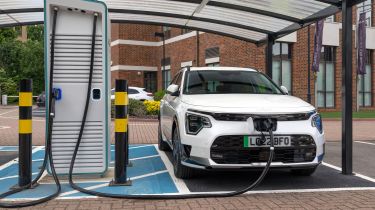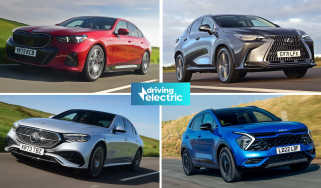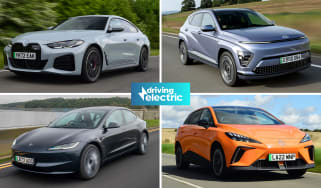How much is the Benefit-in-Kind company car tax on an electric car?
Electric car company car tax is 2% right now but that’s set to increase, will zero-emissions vehicles still be a great choice for business users?

For a few years now, electric cars have been the perfect choice for businesses and company car drivers. A big reason for that is tax. Zero emissions electric cars attract lower Benefit-in-Kind company car tax than petrol and diesel models but change is in the air. In this guide, we’ll lay out everything you need to know about electric car company car tax now and in the future.
There is a massive choice of company cars in the market today so whether you're wanting a super-fast Porsche Taycan or a super-cheap electric car like the MG ZS, there is an option for you. But why have electric cars specifically become so popular as company cars?
Whether they cost £25,000 or £150,000, electric cars currently attract a Benefit-in-Kind (BiK) company-car tax rate of just 2%. In comparison, petrol and diesel-powered cars attract a BiK rate of up to 37% based on their emissions, and even the most efficient plug-in hybrids only reach around 8% BiK rates.
Changing electric car company car tax rates
It’s true that a few years ago you didn’t have to pay any company-car tax for an electric car, then in the 2021/22 tax year it went up to 1%. Then in the 2022/23 tax year it went up to 2% and it has remained that way until now.
More change is coming, however. The 2% BiK rate will only be in place until the end of the 2024/25 financial year. After which, the BiK tax rate on zero-emissions cars will increase by 1% each year until 2028.
EVs are also exempt from road tax (also known as Vehicle Excise Duty or VED), as well as the London Congestion Charge until 2025. From then they will be fully eligible to pay the London Congestion Charge at the standard rate and any vehicle registered after the 1st of April 2025 will pay £10 for road tax in the first year, then £165 from the second year onwards. They will still be able to enter the London Low Emissions Zone (ULEZ) for free though.
These creeping rises in tax on electric cars reflect the growing numbers of electric vehicles on the road. Tax revenues from car owners are falling and are only going to fall faster as more and more electric cars, that don’t need heavily taxed fuel and attract various tax savings, arrive on the roads. The Government is in the delicate position of needing to encourage EV adoption as we move towards its own 2035 ban on the sale of new petrol and diesel cars while also maintaining its crucial tax revenues from motorists.
What is benefit-in-kind company car tax?
For those still wondering what Benefit-in-Kind company-car tax is, the system was introduced in 2002 to encourage both businesses and employees to opt for low-emission vehicles when choosing a company car. The tax rates are linked to the car’s CO2 emissions, with cheaper, more-favourable rates for lower emitting vehicles and making zero-emissions electric cars the cheapest company-car option by far.
Company-car tax is more complicated than VED, as the value not only depends on the vehicle’s emissions, but also its list price and the salary of the employee using it. For a full explanation, keep reading our complete guide to how Benefit-in-Kind works and how it applies to electric cars.
How company-car tax and BiK work for electric cars
When an employee receives a vehicle for personal use from their employer, this is classed as a 'perk', which is taxable. The more formal name is a Benefit-in-Kind (BiK). All perks other than income or remuneration packages are considered to be benefits in kind.
Before going further, it’s important to point out that employees get to choose their company car from a list provided by their company. How much tax the company and the employee each pay depends on the vehicle’s value, its CO2 emissions and the income-tax bracket of the employee.
Paid directly to HMRC, electric car company-car tax in the UK is broken down into two parts: how much the company has to contribute and how much the employee using the car has to contribute. This applies to both electric and non-electric cars.
How much the company has to pay is determined by the car’s 'P11D' value – the value of the car including VAT, options and the delivery fee – as well as its CO2 emissions. The company fills out a form each year and pays the fee to the Treasury.
How much the employee has to pay is more complicated. The BiK rate is determined by the BiK band the vehicle sits in, its P11D value, as well as your income-tax bracket. While you can always use an online BiK calculator, you can work it out yourself using a simple equation. The following formula is used to calculate BiK tax: (P11D value) x (BiK band) x (income-tax bracket) = BiK tax
Electric company car tax calculation example
For example, at the time of writing, an electric BMW i4 eDrive 40 Sport had a P11D value of £58,770. The car's BiK band is determined by the Government. For the financial year 2024/25, it's set at 2%. This means the BiK value for the i4 is £1,175.40, as the BiK value is calculated by multiplying the BiK band by the P11D value (58,770 x 0.02, in this case).
The next step is to work out how much tax you have to pay on the BiK value; this is done by multiplying it by your income tax bracket. If you're a 20% taxpayer, you'll pay 20% of the BiK value, which equates to £235.08 per year in this example. If you're a 40% taxpayer, it'll cost £470.16 annually to run this car.
What is the Benefit-in-Kind (BiK) rate for electric cars?
Using the above formula, the key to the overall BiK tax is the BiK band or BiK rate, expressed as a percentage. This percentage is determined by the Government. In short, the more polluting the vehicle, the higher its BiK rate is. For all fully electric cars on sale, the BiK rate is 2% during the 2024/25 financial year. It's currently set to remain at that level until the 1st of April 2025.
What is the Benefit-in-Kind (BiK) rate for plug-in hybrid cars?
Because BiK rates are determined by CO2 emissions, plug-in hybrids (PHEVs) are also subject to company-car tax in the UK. However, how much tax you pay also depends on how far they can be driven with zero emissions. The below table shows the BiK rates for plug-in hybrid company cars first registered on or after the 6th of April 2021. From this date on, company-car tax has been calculated on CO2 figures from the latest WLTP fuel-economy and emissions testing procedure.
| CO2 (g/km) | Electric range (miles) | 2024/25 (%) | 2025/26 (%) | 2026/27 (%) |
2027/28 (%) |
| 1-50 | >130 | 2 | 3 | 4 | 5 |
| 1-50 | 70-129 | 5 | 6 | 7 | 8 |
| 1-50 | 40-69 | 8 | 9 | 10 | 11 |
| 1-50 | 30-39 | 12 | 13 | 14 | 15 |
| 1-50 | <30 | 14 | 15 | 16 | 17 |
Do vans have to pay company-car tax?
If your company provides you with either a van or an electric van for private use, it doesn't face the company-car tax described above. Rather, vans are subject to a 'van benefit charge'. This has been set at a flat rate of £3,960 during the 2024/25 and 2025/26 financial years for combustion-engined vans, however, the tax rate for fully electric vans is zero.
Recommended

EV Deal of the Day: impressive Volkswagen ID.7 for only £252 per month
Hybrid vans explained: top models, running costs, pros and cons
Most Popular

EV Deal of the Day: family-friendly Peugeot E-5008 for £261 per month



